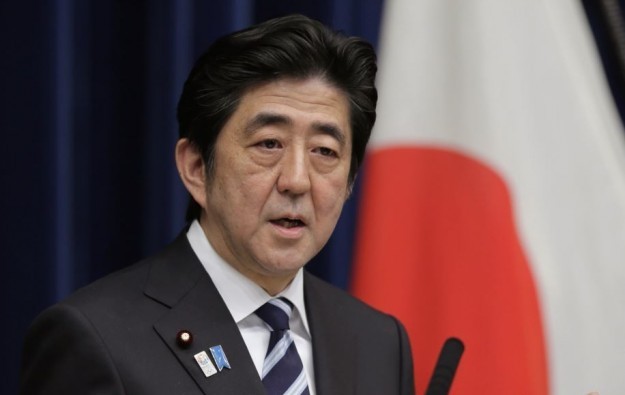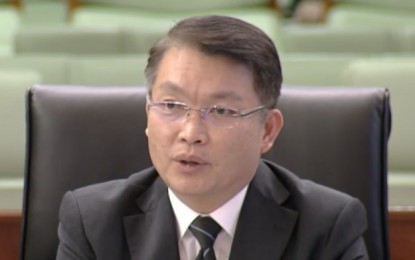Japan casino idea back from dead: Union Gaming
Jul 29, 2016 Newsdesk Japan, Latest News, Top of the deck

The question of legalising casino gaming in Japan could be “back from the dead” following changes in the country’s political landscape since the election earlier this month for the House of Councillors – the upper chamber of the Japanese parliament – says a note from Union Gaming Securities Asia Ltd.
Referring to Prime Minister Shinzo Abe (pictured) and his Liberal Democratic Party (LDP), Union Gaming analyst Grant Govertsen said in a Thursday note: “Abe’s LDP party now holds an outright majority in both houses of the legislature for the first time since 1989, which allows the party to effectively push through just about any legislation it wants without the need for help from its coalition partner (or any other of Japan’s political parties).”
The Buddhist-influenced party Komeito – an ally of Mr Abe’s government – had been seen by a number of commentators on Japanese politics as one of the main stumbling blocks to the legalisation of casinos in Japan – an initiative usually referred to there as involving “integrated resorts” or “IRs”.
“After [LDP] picking up several seats in this month’s House of Councillors (upper house) election, an independent legislator decided to join the LDP thus giving the LDP the 50 percent +1 majority needed to have total control without the need to rely on the minority coalition partner Komeito party,” wrote Mr Govertsen.
“Gaming legislation (aka the ‘IR bill’) can now be passed easily – although the determining factor will be where Abe ranks gaming on the priority ladder,” the analyst added.
A source in Japan familiar with the politics of the casino legalisation process told GGRAsia shortly after the upper house election: “In theory Mr Abe’s increased majority could help the cause of IRs. But a higher priority matter [for Mr Abe] is the economy and constitution.”
That was a reference firstly to yet another reboot – announced on Wednesday via a US$266-billion stimulus package – for so-called “Abenomics”. These are economic policies advocated by Mr Abe since his return to power in the December 2012 general election. Abenomics is based upon what are termed “three arrows”: fiscal stimulus, monetary easing and structural reforms.
The source in Japan was secondly referring to Mr Abe’s desire to redraw Japan’s pacifist post-Second World War constitution, in order to allow – among other things – the country’s Self-Defense Forces to mount operations outside Japan’s borders.
Union Gaming noted: “While earlier this year we would have assigned a very low probability to the passage of the IR bill, the change in political fortunes of the LDP necessitates a change in our view and we would currently assess the odds at better than 50/50 when contemplating the fall 2016 or spring 2017 legislative sessions.”
Two large resorts
Union Gaming said in its Thursday note that there might only be two licences – for large casino resorts – at the first stage of liberalisation following legalisation; rather than a previously-mooted idea of a licence each for two large properties and a licence each for two smaller regional ones.
“We think there could only be two large licences issued, with one going to metro Tokyo and one for Osaka. It is possible that smaller licences could be issued at some later date,” wrote Mr Govertsen.
The brokerage added that the delay in getting casinos into Japan could actually benefit the prospects of Japanese gaming entrepreneur Kazuo Okada and his Universal Entertainment Corp conglomerate; and of pachinko game manufacturer Sega Sammy Holdings Inc. Both groups will have casino operations of their own – running in countries neighbouring Japan – by 2017. In Mr Okada’s case it will be Okada Manila in the Philippines, which is due to have a soft opening in November. Sega Sammy will be a partner with South Korean casino operator Paradise Co in Paradise City at Incheon, South Korea, a resort due to open in April 2017.
“Given what will likely be a strong inherent bias for Japanese participation in IR consortiums, we have to assume that these two Japanese companies will have a seat at the table regardless of the success of their IR projects,” said Union Gaming’s Mr Govertsen.
“We also expect the usual players to have a seat at the table, including most of Macau’s ‘Big Six’ plus Genting Singapore,” wrote the analyst, referring firstly to Macau’s six casino operators; and secondly to Genting Singapore Plc, the developer and operator of the Resorts World Sentosa gaming resort in Singapore.
“We would speculate that international gaming companies might end up participating in Japanese gaming expansion via minority stakes in [any] projects that have development costs in excess of US$10 billion,” added Mr Govertsen.
Related articles
-
 A Thai law on casino resorts may get...
A Thai law on casino resorts may get...Nov 15, 2024
-
 Further Japan IR phase to play for amid...
Further Japan IR phase to play for amid...Oct 31, 2024
More news
-
 Macau to get 36mln visitors in 2025:...
Macau to get 36mln visitors in 2025:...Nov 21, 2024
-
 EBITDA a focus in Macau market share...
EBITDA a focus in Macau market share...Nov 21, 2024
Latest News
Nov 21, 2024
Macau’s 2025 visitor tally could reach 36 million, or a circa 9-percent gain on this year’s projected 33 million. So said Lei Wai Nong (pictured in a file photo), the city’s Secretary for...Sign up to our FREE Newsletter
 (Click here for more)
(Click here for more)
Pick of the Day
”[Baccarat side bets in Macau] are becoming more popular amongst players, based on what we observed when we conducted our [monthly premium mass] table surveys”
George Choi and Timothy Chau
Analysts at Citigroup
Most Popular
 Gaming technology firm IGT reports hacking incident November 21, 2024
Gaming technology firm IGT reports hacking incident November 21, 2024  US$30bln 2025 GGR target achievable for Macau: CE November 19, 2024
US$30bln 2025 GGR target achievable for Macau: CE November 19, 2024  Marina Bay Sands projects 40pct EBITDA leap post extension November 20, 2024
Marina Bay Sands projects 40pct EBITDA leap post extension November 20, 2024  Macau big-event outdoor venue gets trial run Dec 28: CE November 20, 2024
Macau big-event outdoor venue gets trial run Dec 28: CE November 20, 2024  Future of gaming is the online format: Pagcor chairman November 20, 2024
Future of gaming is the online format: Pagcor chairman November 20, 2024









